Are Yorkie Dogs Good Pets? Absolutely, and PETS.EDU.VN is here to show you why! These charming little companions, known for their loyalty and affectionate nature, can be wonderful additions to the right home. Discover everything you need to know about Yorkshire Terriers, from their playful personality to their specific care requirements, ensuring a harmonious and loving relationship. This article will cover yorkie ownership, yorkie temperament, and yorkie care.
1. Understanding the Yorkshire Terrier Breed
The Yorkshire Terrier, or Yorkie, is more than just a pretty face; it’s a breed with a fascinating history and a unique set of characteristics. Originating in Yorkshire, England, during the 19th century, these dogs were initially bred to catch rats in clothing mills and mines. Today, they’re cherished for their companionship and glamorous appearance.
1.1. Historical Background
Yorkies have come a long way from their working-class roots. Scottish weavers who migrated to England brought with them various terrier types, which were then bred to create the Yorkshire Terrier. These early Yorkies were larger than the ones we know today. Over time, selective breeding refined their size and appearance, transforming them into the fashionable companions they are now. According to the Yorkshire Terrier Club of America, this transformation reflects the breed’s adaptability and enduring appeal.
1.2. Physical Characteristics
A full-grown Yorkie typically stands 7 to 8 inches tall and weighs no more than 7 pounds. One of their most distinctive features is their long, silky coat, which is often described as hair-like rather than fur-like. This coat is typically a beautiful blue and tan color, adding to their elegant appearance.
| Feature | Description |
|---|---|
| Height | 7-8 inches |
| Weight | Up to 7 pounds |
| Coat | Long, silky, blue and tan |
| Lifespan | 11-15 years |
| Temperament | Affectionate, playful, and sometimes a bit bossy |
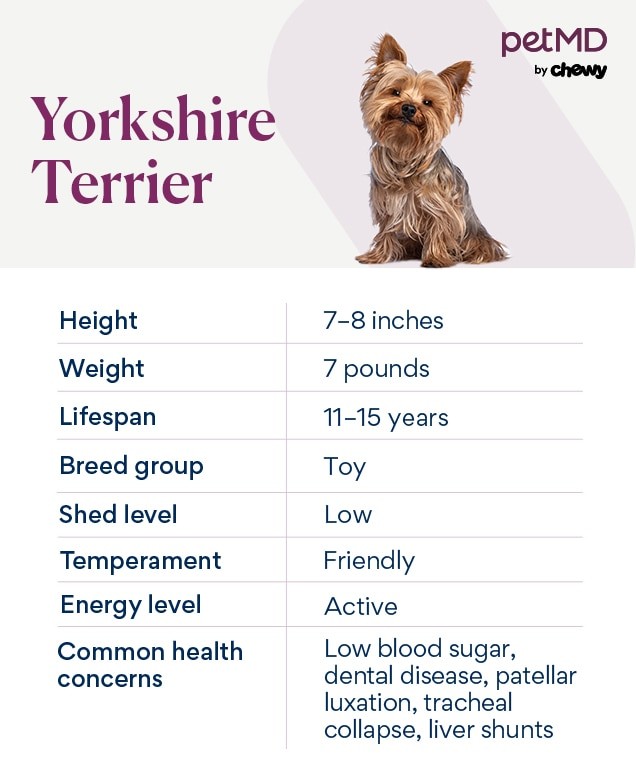
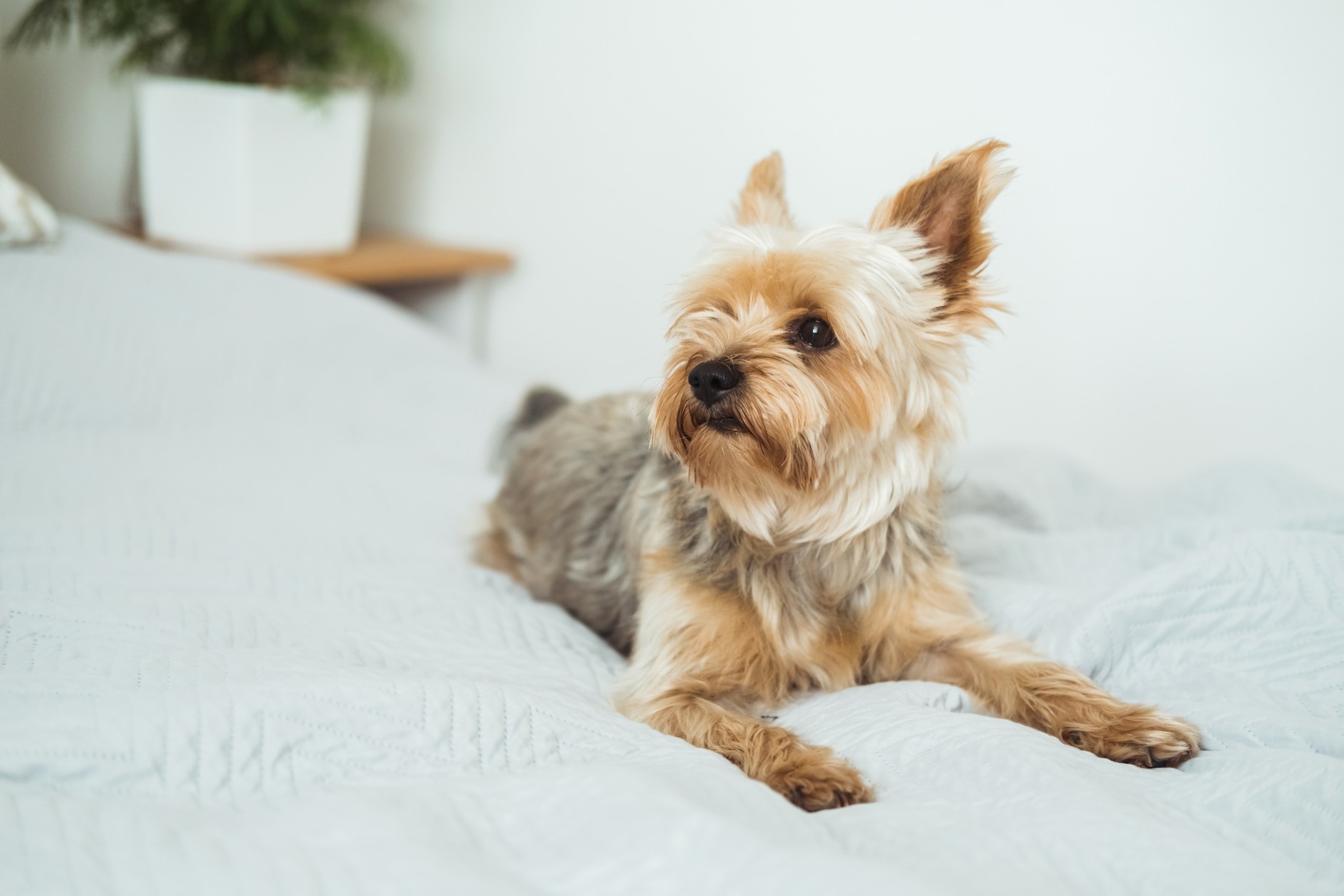
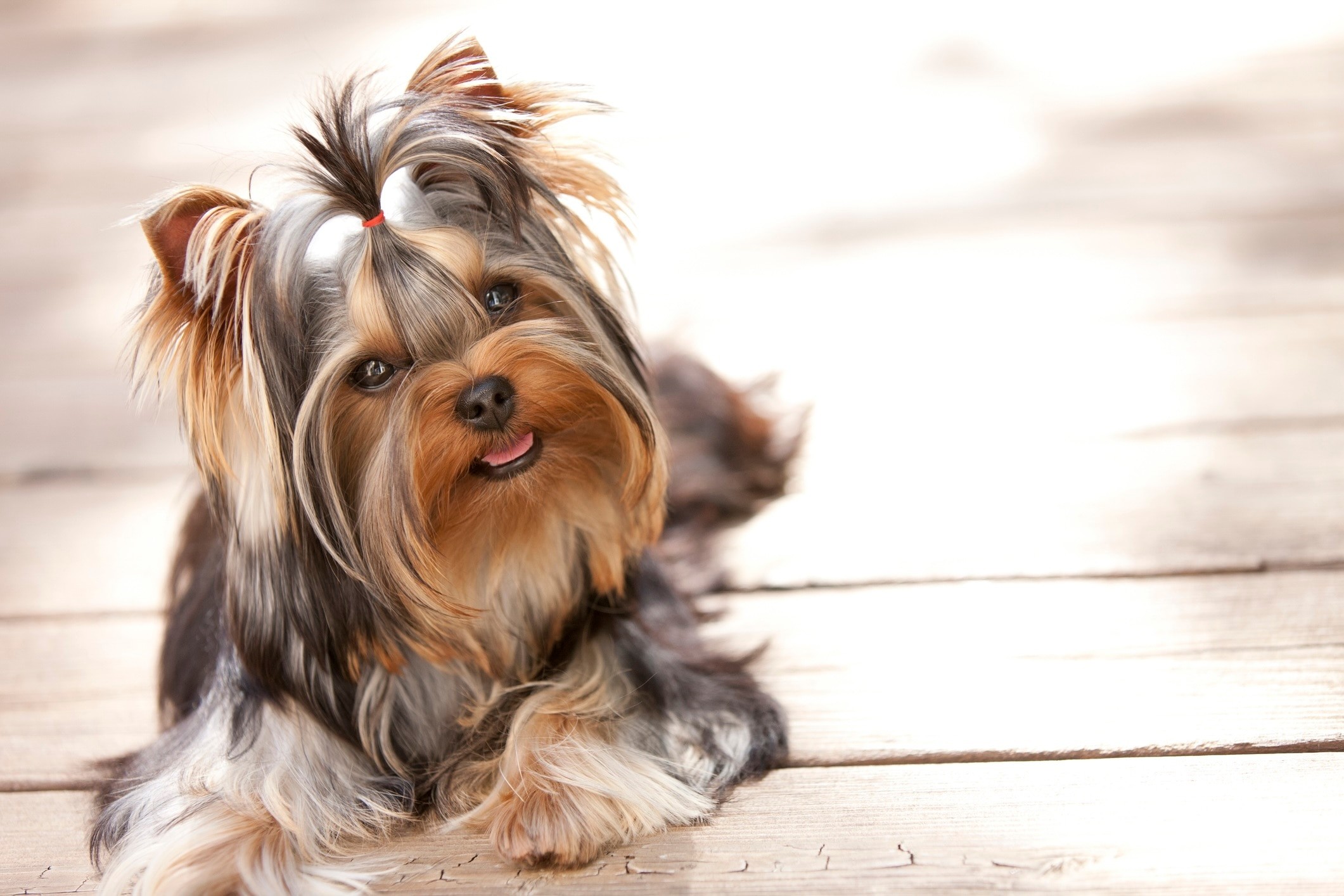
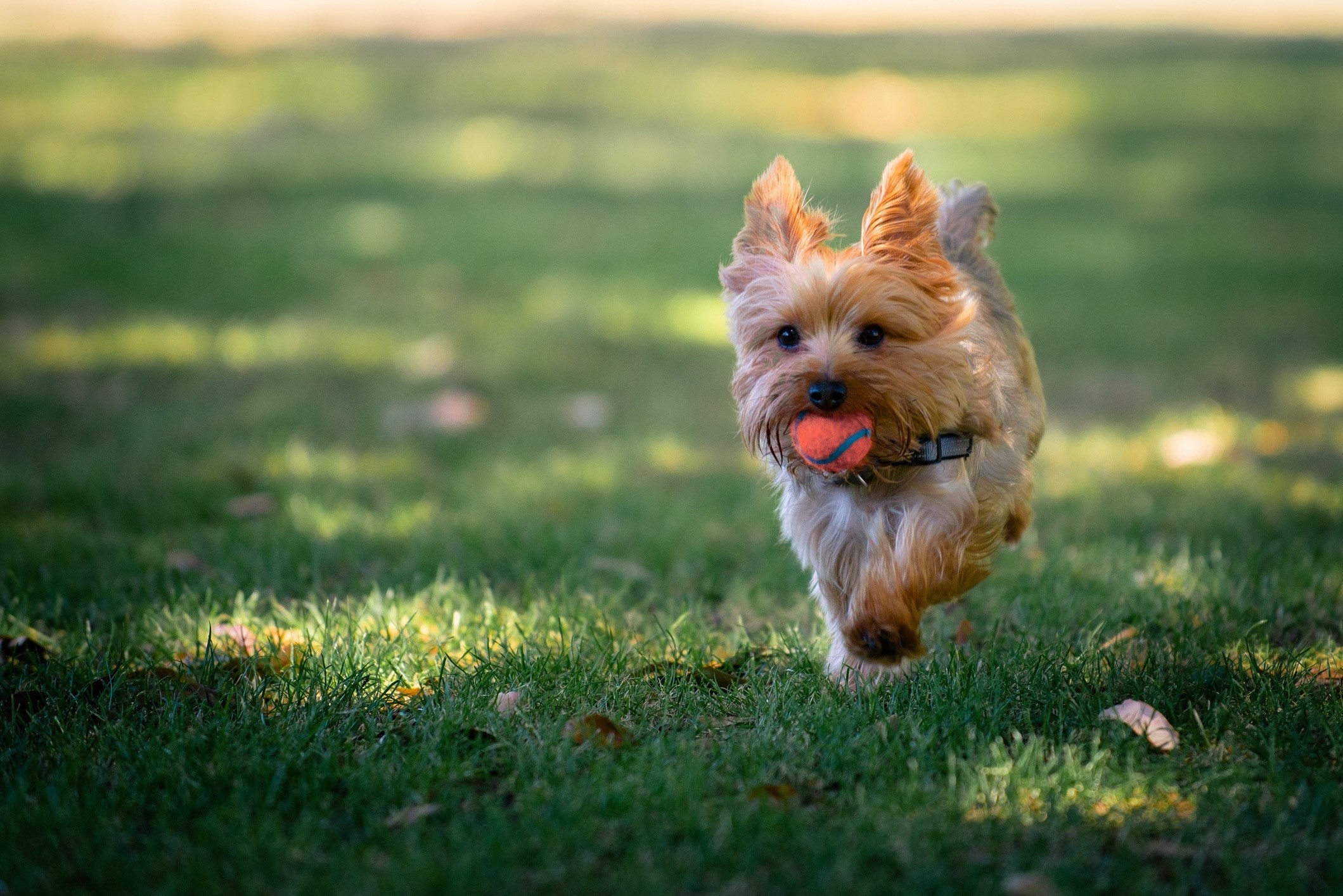
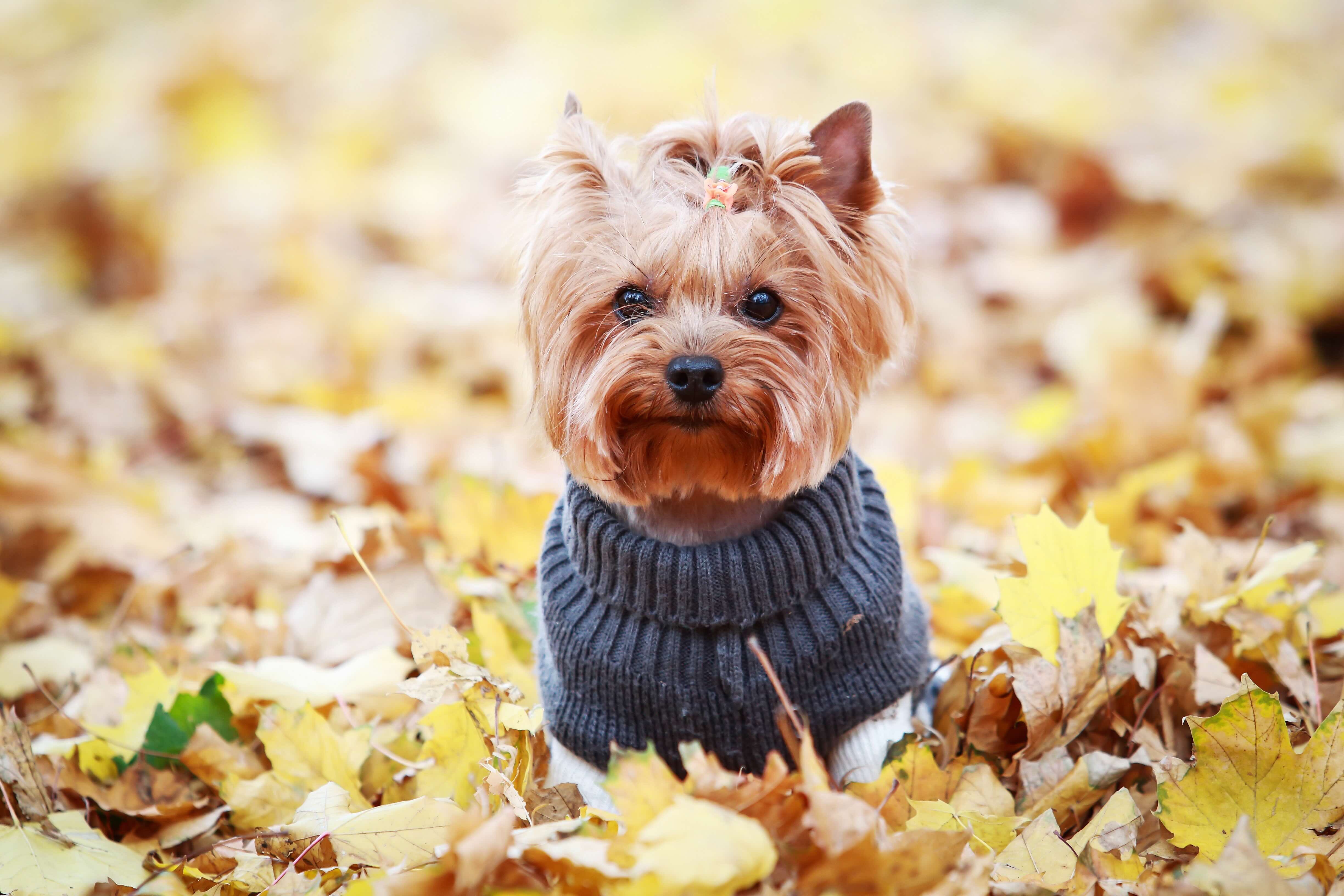
Yorkshire Terriers make wonderful family pets, known for their affectionate and playful nature.
2. Why Yorkies Make Great Pets
Yorkies possess a multitude of qualities that make them excellent companions for a variety of lifestyles. They are adaptable, affectionate, and relatively easy to care for, making them a popular choice for first-time dog owners and experienced pet parents alike.
2.1. Affectionate and Loyal
Yorkies are known for their deep bonds with their families. They thrive on attention and love to be close to their owners, whether cuddling on the couch or following you from room to room. This loyalty makes them excellent emotional support animals and devoted companions.
2.2. Adaptable to Different Living Situations
Whether you live in a spacious house or a cozy apartment, Yorkies can adapt to various living environments. Their small size and moderate energy levels mean they don’t require a lot of space to exercise. Regular walks and indoor playtime are usually sufficient to keep them happy and healthy.
2.3. Playful and Energetic
Despite their small size, Yorkies have a playful and energetic personality. They enjoy playing with toys, going for walks, and engaging in interactive games with their owners. This playful nature makes them entertaining companions who can bring joy and laughter to your home.
2.4. Relatively Easy to Train
Yorkies are intelligent dogs that can be relatively easy to train, especially with positive reinforcement methods. They respond well to praise, treats, and consistent training sessions. Early socialization and obedience training can help them become well-behaved and confident companions.
3. Understanding the Temperament of a Yorkie
Yorkies have distinct personalities. Understanding their temperament can help you determine if this breed is the right fit for your lifestyle and expectations.
3.1. General Temperament Traits
Yorkies are known for being brave, confident, and sometimes a bit bossy. They often have a “big dog” attitude in a small dog body. They are also curious, intelligent, and enjoy being the center of attention.
3.2. Socialization and Interaction with Children and Other Pets
While Yorkies can be affectionate with family members, it’s important to socialize them early, especially if you have children or other pets. They can be protective and may not always tolerate rough handling from young children. Supervise interactions between Yorkies and children to ensure everyone’s safety and comfort.
Yorkies can also coexist with other pets, but early socialization is key. Introduce them to other animals gradually and monitor their interactions to prevent any conflicts. Some Yorkies may prefer to be the only pet in the household, while others can thrive in multi-pet families.
3.3. Barking Tendencies and How to Manage It
Yorkies are known for their barking tendencies. They may bark to alert their owners to potential threats, express excitement, or simply seek attention. While some barking is normal, excessive barking can be a nuisance.
To manage barking, identify the triggers and address them accordingly. Provide plenty of exercise and mental stimulation to reduce boredom and anxiety. Teach your Yorkie a “quiet” command and reward them for obeying. Consistent training and management can help minimize excessive barking.
4. Essential Care Requirements for Yorkies
Providing proper care for a Yorkie involves several key areas, including grooming, exercise, nutrition, and healthcare. Understanding these requirements can help you ensure your Yorkie lives a long, healthy, and happy life.
4.1. Grooming Needs
Yorkies have a high-maintenance coat that requires regular grooming to prevent tangles and mats.
-
Brushing: Daily brushing is essential to keep their coat smooth and free of knots. Use a soft-bristled brush and a metal comb to gently remove any tangles.
-
Bathing: Bathe your Yorkie every two to three weeks using a mild, moisturizing shampoo. Be sure to rinse thoroughly to remove any residue.
-
Haircuts: Regular haircuts are necessary to keep their coat at a manageable length. Many owners opt for a “puppy cut,” which is shorter and easier to maintain.
-
Eye Care: Yorkies are prone to tear stains, so clean their eyes daily with a damp cloth or a specialized eye-cleaning solution.
-
Ear Care: Check their ears weekly and clean them as needed to prevent infections.
-
Nail Trimming: Trim their nails every two to three weeks to prevent overgrowth and discomfort.
4.2. Exercise Requirements
Yorkies have moderate energy levels and require regular exercise to stay physically and mentally stimulated.
-
Daily Walks: Take your Yorkie for daily walks, even if they’re short. Walks provide exercise, mental stimulation, and opportunities for socialization.
-
Playtime: Engage in interactive playtime with your Yorkie, such as fetch or tug-of-war.
-
Indoor Activities: Provide indoor activities, such as puzzle toys or hide-and-seek, to keep them entertained when you can’t go outside.
4.3. Nutritional Needs
Proper nutrition is essential for maintaining your Yorkie’s health and well-being.
-
High-Quality Dog Food: Feed your Yorkie a high-quality dog food that is specifically formulated for small breeds.
-
Portion Control: Control portion sizes to prevent overeating and weight gain. Follow the feeding guidelines on the dog food label and consult with your veterinarian.
-
Frequent Feedings: Yorkie puppies are prone to hypoglycemia (low blood sugar), so they should be fed frequent, small meals throughout the day.
-
Fresh Water: Always provide access to fresh, clean water.
4.4. Health Considerations
Yorkies are prone to certain health issues, so regular veterinary care is essential.
-
Regular Checkups: Schedule regular checkups with your veterinarian to monitor your Yorkie’s health and detect any potential problems early.
-
Dental Care: Yorkies are prone to dental disease, so brush their teeth daily and schedule professional dental cleanings as recommended by your veterinarian.
-
Common Health Issues: Be aware of common health issues in Yorkies, such as patellar luxation, tracheal collapse, and liver shunts, and seek veterinary care if you notice any symptoms.
-
Vaccinations and Parasite Control: Keep your Yorkie up-to-date on vaccinations and parasite control to protect them from infectious diseases.
Regular grooming is crucial for Yorkies, including haircuts to maintain their silky coat.
5. Common Health Problems in Yorkies
While Yorkies are generally healthy dogs, they are prone to certain health problems that potential owners should be aware of.
5.1. Hypoglycemia
Hypoglycemia, or low blood sugar, is a common concern in Yorkie puppies due to their small size and rapid metabolism.
-
Symptoms: Weakness, lack of appetite, disorientation, tremors, and seizures.
-
Prevention: Feed Yorkie puppies frequent, small meals throughout the day to maintain stable blood sugar levels.
-
Treatment: If your Yorkie shows signs of hypoglycemia, contact your veterinarian immediately. They may recommend giving your dog a small amount of Karo syrup or honey to raise their blood sugar levels.
5.2. Dental Disease
Dental disease is a prevalent issue in small breeds like Yorkies due to their small mouths and crowded teeth.
-
Symptoms: Bad breath, tartar buildup, inflamed gums, and tooth loss.
-
Prevention: Brush your Yorkie’s teeth daily using a pet-specific toothpaste and provide dental chews to help remove plaque and tartar.
-
Treatment: Schedule regular dental cleanings with your veterinarian to remove plaque and tartar buildup and address any dental problems.
5.3. Patellar Luxation
Patellar luxation occurs when the kneecap (patella) slips out of its normal groove, causing pain and lameness.
-
Symptoms: Intermittent lameness, skipping, or difficulty walking.
-
Diagnosis: Your veterinarian can diagnose patellar luxation through a physical exam and X-rays.
-
Treatment: Treatment options range from pain management with anti-inflammatory medications to surgery to correct the alignment of the kneecap.
5.4. Tracheal Collapse
Tracheal collapse is a condition in which the trachea (windpipe) weakens and flattens, making it difficult for the dog to breathe.
-
Symptoms: Dry cough, wheezing, and difficulty breathing, especially during exercise or excitement.
-
Management: Manage this condition with medications to reduce inflammation and open the airways. Use a harness instead of a collar to avoid putting pressure on the trachea.
-
Severe Cases: May require surgical intervention.
5.5. Liver Shunt (Portosystemic Shunt)
A liver shunt is an abnormal connection between the blood vessels in or around the liver, causing blood to bypass the liver and allowing toxins to build up in the bloodstream.
-
Symptoms: Slow growth, disorientation, circling, and seizures, especially after eating a high-protein meal.
-
Diagnosis: Diagnosing a liver shunt may require blood tests, abdominal ultrasounds, CT/MRI scans, or exploratory surgery.
-
Treatment: Treatment options include dietary changes, medications, and surgery to correct the abnormal blood vessel connection.
| Health Issue | Symptoms | Prevention | Treatment |
|---|---|---|---|
| Hypoglycemia | Weakness, lack of appetite, disorientation, tremors, seizures | Frequent, small meals | Karo syrup or honey, veterinary care |
| Dental Disease | Bad breath, tartar buildup, inflamed gums, tooth loss | Daily toothbrushing, dental chews | Professional dental cleanings |
| Patellar Luxation | Intermittent lameness, skipping, difficulty walking | Maintain healthy weight, avoid strenuous activities | Pain management, surgery |
| Tracheal Collapse | Dry cough, wheezing, difficulty breathing | Weight control, harness instead of collar | Medications, surgery in severe cases |
| Liver Shunt | Slow growth, disorientation, circling, seizures after high-protein meals | No specific prevention, early detection through regular veterinary checkups is crucial | Dietary changes, medications, surgery |
6. Feeding Your Yorkie: A Guide to Nutrition
Proper nutrition is vital for a Yorkie’s health and longevity. Knowing what, how, and how much to feed your Yorkie is essential.
6.1. Choosing the Right Dog Food
Selecting a high-quality dog food approved by the Association of American Feed Control Officials (AAFCO) is crucial. This ensures your Yorkie receives a complete and balanced diet.
- Kibble vs. Wet Food: Both kibble and wet food can be suitable. Kibble can help with dental health, while wet food can be more palatable and hydrating.
- Ingredients to Look For: Look for dog foods with real meat, whole grains, and vegetables. Avoid foods with excessive fillers, artificial colors, and preservatives.
6.2. Feeding Schedule and Portion Sizes
- Puppies: Yorkie puppies need frequent feedings to maintain their blood sugar levels. Feed them three to four small meals per day.
- Adults: Adult Yorkies can be fed two to three times per day.
- Portion Sizes: Consult with your veterinarian to determine the appropriate portion sizes for your Yorkie based on their age, weight, activity level, and health status.
6.3. Treats and Supplements
- Treats: Offer treats in moderation, as they can quickly add up calories. Choose healthy treats that are low in calories and sugar.
- Supplements: Your veterinarian may recommend supplements, such as omega-3 fatty acids, to support your Yorkie’s skin, coat, and joint health.
6.4. Foods to Avoid
Certain foods are toxic to dogs and should be avoided.
- Chocolate
- Grapes and Raisins
- Onions and Garlic
- Avocado
- Xylitol (artificial sweetener)
| Life Stage | Feeding Frequency | Portion Size | Recommended Food Type |
|---|---|---|---|
| Puppy | 3-4 times per day | Small, frequent meals as per vet recommendation | Puppy-specific formula, high in protein and calories |
| Adult | 2-3 times per day | As per vet recommendation, considering activity level | High-quality adult formula, balanced nutrition |
| Senior | 2 times per day | As per vet recommendation, may need softer food | Senior-specific formula, lower in calories |
A balanced diet is essential for the health and well-being of Yorkies, ensuring they receive all necessary nutrients.
7. Training and Socialization for Yorkies
Training and socialization are crucial for Yorkies to develop into well-behaved and confident companions.
7.1. Basic Obedience Training
- Start Early: Begin training your Yorkie puppy as soon as you bring them home.
- Positive Reinforcement: Use positive reinforcement methods, such as praise, treats, and toys, to reward desired behaviors.
- Consistency: Be consistent with your commands and expectations.
- Short Sessions: Keep training sessions short and fun to maintain your Yorkie’s attention.
7.2. House Training
- Establish a Routine: Establish a consistent potty routine by taking your Yorkie outside at regular intervals, such as after waking up, after meals, and before bedtime.
- Reward Success: Reward your Yorkie immediately after they eliminate outside.
- Clean Up Accidents: Clean up accidents thoroughly to remove any lingering odors that may attract your Yorkie back to the same spot.
7.3. Leash Training
- Introduce the Leash and Collar: Introduce your Yorkie to the leash and collar gradually, allowing them to get used to wearing them.
- Start Indoors: Begin leash training indoors before venturing outside.
- Use Positive Reinforcement: Reward your Yorkie for walking nicely on the leash.
7.4. Socialization
- Expose to New Experiences: Expose your Yorkie to a variety of new experiences, people, and environments from a young age.
- Supervise Interactions: Supervise interactions with other dogs and people to ensure positive experiences.
- Attend Puppy Classes: Consider enrolling your Yorkie in puppy classes to socialize them with other dogs and learn basic obedience commands.
8. Yorkie Grooming: Maintaining that Silky Coat
Yorkies are known for their beautiful, silky coats, but maintaining that coat requires regular grooming.
8.1. Brushing Techniques
- Daily Brushing: Brush your Yorkie’s coat daily to prevent tangles and mats.
- Use the Right Tools: Use a soft-bristled brush and a metal comb to gently remove any tangles.
- Start at the Skin: Start brushing at the skin and work your way out to the ends of the hair.
8.2. Bathing Tips
- Frequency: Bathe your Yorkie every two to three weeks, or as needed.
- Use a Mild Shampoo: Use a mild, moisturizing shampoo that is specifically formulated for dogs.
- Rinse Thoroughly: Rinse thoroughly to remove any shampoo residue.
8.3. Haircuts and Styles
- Puppy Cut: A shorter, easier-to-maintain haircut that is popular among Yorkie owners.
- Show Cut: A longer, flowing coat that requires extensive grooming.
- Professional Grooming: Consider taking your Yorkie to a professional groomer every six to eight weeks for a haircut and other grooming services.
8.4. Eye and Ear Cleaning
- Eye Cleaning: Clean your Yorkie’s eyes daily with a damp cloth or a specialized eye-cleaning solution to prevent tear stains.
- Ear Cleaning: Check your Yorkie’s ears weekly and clean them as needed to prevent infections.
Regular exercise and playtime are essential for Yorkies to stay physically and mentally stimulated.
9. Fun Activities to Do with Your Yorkie
Yorkies are playful and energetic dogs that enjoy participating in a variety of activities with their owners.
9.1. Games and Toys
- Fetch: Yorkies enjoy playing fetch with small balls or toys.
- Tug-of-War: Engage in a friendly game of tug-of-war with your Yorkie.
- Puzzle Toys: Provide puzzle toys to challenge your Yorkie mentally and keep them entertained.
9.2. Outdoor Adventures
- Walks: Take your Yorkie for daily walks in the park or around the neighborhood.
- Hiking: If your Yorkie is up for it, take them on a short hike.
- Dog Parks: Visit a dog park to socialize your Yorkie with other dogs.
9.3. Training and Agility
- Obedience Classes: Enroll your Yorkie in obedience classes to learn new commands and improve their behavior.
- Agility Training: Try agility training to challenge your Yorkie physically and mentally.
- Nose Work: Engage in nose work activities to tap into your Yorkie’s natural scenting abilities.
10. Considerations for Potential Yorkie Owners
Before bringing a Yorkie into your home, there are several important considerations to keep in mind.
10.1. Time Commitment
Yorkies require a significant time commitment for grooming, training, exercise, and companionship. Are you prepared to dedicate the necessary time and attention to your Yorkie?
10.2. Cost of Ownership
Owning a Yorkie can be expensive. You’ll need to factor in the costs of food, grooming supplies, veterinary care, training, and other expenses. Can you afford the financial commitment of owning a Yorkie?
10.3. Lifestyle Compatibility
Yorkies are best suited for owners who can provide them with plenty of attention, love, and care. Are you prepared to adapt your lifestyle to accommodate the needs of a Yorkie?
10.4. Finding a Reputable Breeder or Rescue Organization
If you decide to purchase a Yorkie puppy, it’s important to find a reputable breeder who breeds healthy, well-socialized dogs. Alternatively, consider adopting a Yorkie from a rescue organization.
11. Yorkie FAQs: Addressing Common Questions
Here are some frequently asked questions about Yorkies:
11.1. How long do Yorkies live?
The average lifespan of a Yorkie is 11-15 years.
11.2. How big do Yorkies get?
Yorkies typically stand 7-8 inches tall and weigh up to 7 pounds.
11.3. Are Yorkies hypoallergenic?
While no dog is truly hypoallergenic, Yorkies are often considered to be a good choice for people with allergies because they produce less dander than some other breeds.
11.4. How much do Yorkies cost?
Yorkie puppies from reputable breeders can cost between $800 and $2,500.
11.5. Do Yorkies shed?
Yorkies shed very little, which is another reason why they are often considered to be a good choice for people with allergies.
11.6. Are Yorkies good family dogs?
Yorkies can be good family dogs, but they may not be the best choice for families with young children due to their small size and delicate build.
11.7. Are Yorkies high-maintenance?
Yorkies can be high-maintenance due to their grooming needs.
11.8. Should I buy a teacup Yorkie?
No, you should not buy a teacup Yorkie. Teacup dogs are bred to be as small as possible, often at the expense of their health.
11.9. What are some common health problems in Yorkies?
Some common health problems in Yorkies include hypoglycemia, dental disease, patellar luxation, tracheal collapse, and liver shunts.
11.10. How often should I groom my Yorkie?
You should brush your Yorkie’s coat daily and bathe them every two to three weeks. Regular haircuts are also necessary to keep their coat at a manageable length.
Regular grooming is essential for Yorkies, especially during colder months.
12. Conclusion: Is a Yorkie the Right Pet for You?
Yorkies can make wonderful pets for the right owners. They are affectionate, loyal, and adaptable dogs that can bring joy and companionship to your life. However, they also require a significant time commitment for grooming, training, and care.
Before bringing a Yorkie into your home, carefully consider your lifestyle, financial resources, and ability to meet the needs of this breed. If you are prepared to provide a loving and supportive environment, a Yorkie can be a wonderful addition to your family.
Ready to learn more about Yorkies and other amazing pets? Visit PETS.EDU.VN for expert advice, in-depth guides, and heartwarming stories. Our team of experienced professionals is dedicated to providing you with the most accurate and up-to-date information to help you care for your beloved companions.
If you have more questions, contact us at 789 Paw Lane, Petville, CA 91234, United States, Whatsapp: +1 555-987-6543. You can also visit our website pets.edu.vn for more information.